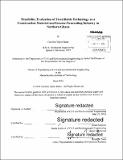Feasibility evaluation of fired brick technology as a construction material and income-generating industry in Northern Ghana
Author(s)
Bates, Caroline Nijole
DownloadFull printable version (23.81Mb)
Other Contributors
Massachusetts Institute of Technology. Department of Civil and Environmental Engineering.
Advisor
Susan Murcott.
Terms of use
Metadata
Show full item recordAbstract
This work evaluates the potential to develop fired brick production in the Northern Region of Ghana. While several brick factories operate in southern Ghana, no factories are known to exist in northern Ghana, which remains economically depressed despite the fact that the World Bank now classifies Ghana as a lower middle income country. The development of a sustainable brick industry in northern Ghana could provide employment and stability to communities, a local source of construction material, and could support Pure Home Water in its aim of becoming locally and financially self-sustaining. The evaluation includes visits to existing brick factories in southern Ghana, field investigations to evaluate the quality and quantity of clay-rich soil available for brick making, laboratory testing of soil and brick samples, consideration of brick production best practices, and a preliminary economic assessment of brick making in Ghana. The study concludes that the Gbalahi Plot soils are most suitable for brick production using the existing intermittent kiln technologies in Ghana. However, given the intense energy requirements for fired brick production using intermittent kilns, alternative fuel sources and kiln technologies should be considered to reduce energy consumption and emissions and mechanization should be incorporated to reduce worker drudgery. Preliminary economic analyses show that brick production is profitable but that the industry is subject to inherent risks related to climatic and cultural factors in Ghana.
Description
Thesis: M. Eng., Massachusetts Institute of Technology, Department of Civil and Environmental Engineering, 2014. Cataloged from PDF version of thesis. Includes bibliographical references (pages 80-83).
Date issued
2014Department
Massachusetts Institute of Technology. Department of Civil and Environmental EngineeringPublisher
Massachusetts Institute of Technology
Keywords
Civil and Environmental Engineering.